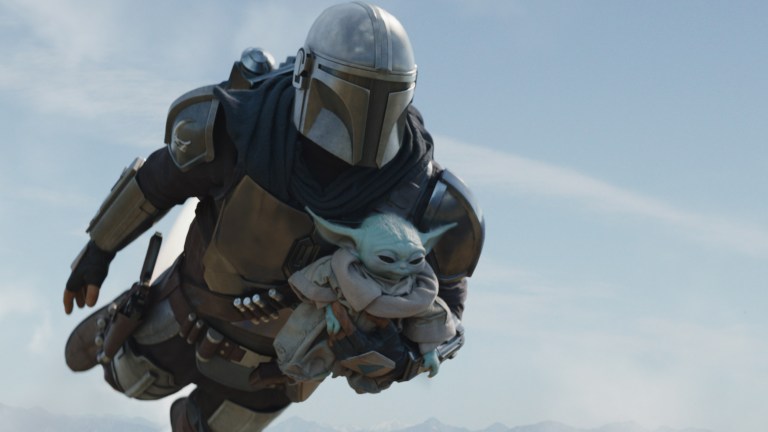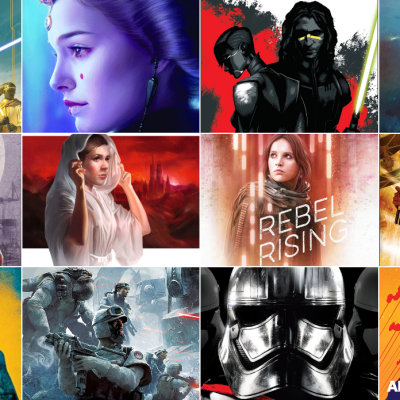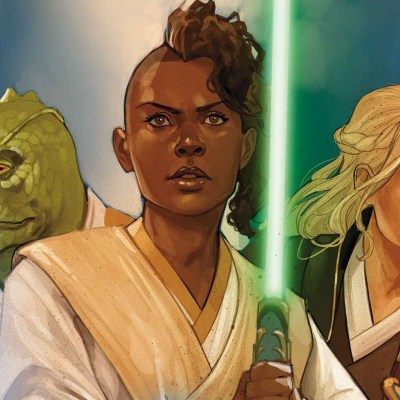How The Mandalorian Challenges Star Wars’ History of Bad Dads
Mando and Grogu have something most father-son duos in Star Wars don't: a healthy relationship.

This Star Wars: The Mandalorian article contains spoilers.
On the surface, the story of Star Wars is one of good and evil, oppression and rebellion, failure and redemption – the sort of big, broad themes that have resonated across decades and through generations. In actuality, Star Wars is a story of seemingly unending daddy issues, as a series of men who range from outright horrible to simply neglectful abandon, abuse, and otherwise damage their children to such a degree that the entire galaxy often ends up paying the price for it.
Though Anakin Skywalker is probably the franchise’s most egregiously bad father, he’s hardly alone, as everyone from Galen Erso to Jango Fett can’t seem to stop messing up their kids. Even Han Solo, a beloved hero of the Original Trilogy, turns out to be such a terrible father that his son ends up not just leading an evil army but literally committing patricide. Heck, even the Force itself is a pseudo-deadbeat dad, if we’re really meant to believe the whole Anakin immaculate conception thing from The Phantom Menace.
This failure isn’t limited to merely biological fathers either, there are plenty of father figures in this universe who are just as emotionally unavailable and dysfunctional as any biological dad. Qui-Gon Jinn certainly means well when it comes to young Anakin, but he’s also a tragic failure who cared more about the potential power in the boy than the heartbreak he inflicted upon him. And Obi-Wan Kenobi might claim young Luke, but he’s not exactly a hands-on parental type either, dumping the child off on strangers for the whole day-to-day raising thing and manipulating him throughout the Original Trilogy, even after his own death.
Stream your Star Wars favorites right here!
This is a big part of the reason why the Disney+ series The Mandalorian lands so hard emotionally. Sure, a show that is essentially a space Western full of familiar tropes and occasional fan service probably didn’t intend to become the franchise’s most complete treatise on the power and importance of fatherhood. Yet, the story of a lone bounty hunter and the tiny Force-wielding creature he takes under his wing is still quietly revolutionary, a reminder of the power of love – and, specifically, parenthood – to forge us into something greater than the sum of our parts.
Mandalorian Din Djarin is a bounty hunter who works and lives alone. An orphan whose adopted people are almost extinct, he has few friends and generally trusts no one. He’s basically the definition of a lone wolf: Ruthless, removed, and generally uncaring. At least, until he winds up the unintended caretaker of a tiny being known as Grogu (or Baby Yoda, to the internet) who eventually changes his life and steals his heart.
Mandalorians are not generally known for their emotional natures, and Din initially appears to be as cool and largely unfeeling as one might expect from a member of a warrior race. Yet, the immediate kinship he feels with this creature despite their different species is understandable – he himself was adopted into Mandalorian culture as a foundling, after all. But it grows into something much deeper and, along the way, gives viewers a reason to invest in a character who doesn’t initially have a ton of defining personal characteristics. We care about Mando because he cares about Grogu.
In the early episodes of The Mandalorian, it’s cute fun to watch Mando attempt to prevent his tiny charge from pushing every button on his ship’s console and trying to eat virtually everything in sight, all while Grogu refuses to listen to even the most basic requests. But by the time the series’ second season ends we’ve seen Din not only risk his own life but break with everything he’s ever previously known – from the code of the Bounty Hunters’ Guild to the most stringent tenets of his own religion – and not just in the name of keeping this child safe but giving him his best chance at a happy life.
That, as the kids say, is growth.
Star Wars stories have often revolved around turbulent father-son relationships, but The Mandalorian is really the first time we’ve seen one portrayed like this, in which the central duo in question actually grows closer over time rather than splits further apart. From Mando’s increasingly protective dad vibes – complete with overt threats of violence to anyone who so much as looks at his tiny boy the wrong way – to Grogu’s obvious attachment to his new father figure, the two slowly become less of a pair and more of a singular entity. Where one goes, the other follows. (Literally, most of the time.) They travel. They play Force catch. And most importantly, they become a little two-person family, both in terms of their clan identification and their day-to-day lives.
But what really makes Djarin’s love for Grogu so affecting is the sacrificial nature of it. He’ll overlook the dark and tumultuous history his people share with the Jedi in order to find a tutor to help the child control his powers. Din will break his word, forge uneasy partnerships with unsavory people, and violate key tenets of the Way he’s dedicated his life to following, including removing his helmet and revealing his face in public. He’ll risk his life for Grogu, multiple times, protecting him from both generally bad people and the Dark Side itself. And after all of that, he’ll still relinquish the best thing in his life to a stranger if that man is capable of giving his adopted son something that he himself cannot.
In Scripture, such sacrificial love is rightly described as a vocation, a calling to something greater than yourself. And The Mandalorian’s second season fully bears that idea out, as our hero repeatedly puts Grogu’s best interests in front of his own and does his best to give him a future on the side of the light, even if doing so means Din himself may never get the chance to be a part of it.
Imagine what the story of Star Wars might have been like were there more father figures like Din.
At the moment, we don’t know whether Din and Grogu will be reunited in The Mandalorian Season 3, though common sense and Disney’s merchandising bottom line certainly makes that outcome seem more likely than not. But even if Clan Mudhorn is destined for a lengthy separation, Grogu’s presence in his life has clearly changed Din in many ways and inarguably changed his story, ultimately opening his heart – possibly for the first time – to someone else. He is without a doubt a better man now than he was when this series started, and Star Wars as a franchise is better for finally telling the story of a man who, for once, didn’t let his son down when it counted.



